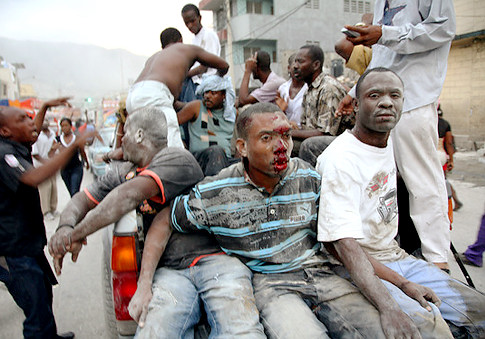 Venezuela’s Hugo Chavez has gone off the deep end again, claiming the U.S. engineered the Haiti earthquake. It’s a laughable malevolence, of course. But given the spectacular U.S. aid effort, it’s also a threat.
Venezuela’s Hugo Chavez has gone off the deep end again, claiming the U.S. engineered the Haiti earthquake. It’s a laughable malevolence, of course. But given the spectacular U.S. aid effort, it’s also a threat.
Right now, the dictator’s No. 1 foreign policy aim is to discredit the U.S. aid effort in Haiti. Shortly after Haiti’s Jan. 12 earthquake, Chavez, trying to whip up paranoia, accused America of seeking a “military occupation” there.
When that didn’t work and U.S. aircraft carriers and hospital ships steamed in to rescue ravaged Port-au-Prince, Chavez told Spanish newspaper ABC that the earthquake was the product of a “tectonic weapon” launched by the U.S. Navy in a test-run for the U.S.’ ultimate target: Iran.
As lunatic as it sounds, the Venezuelan dictator knows what he’s doing: Haitians are vulnerable now and seeking to make sense of the catastrophe. Chavez’s words try to tap into an existing Caribbean cultural undercurrent of paranoia about CIA influence to discredit U.S. help. That’s important to Chavez because U.S. aid is building vast reservoirs of goodwill in Haiti and beyond and it will come at the expense of his own.
For Chavez, the U.S. aid contrasts sharply with his own promises to Haiti he never delivered on. The sight of U.S. troops delivering aid swiftly exposes him as a blowhard who runs his mouth and breaks his word.
Domestically, it’s even worse for him: Venezuelans still remember that during 1999’s mudslide disaster on their Vargas coast President Clinton launched a disaster response similar to the one seen in Haiti, but Chavez turned away the U.S. aircraft carrier and rescuers as they were halfway there.
Any remembrance of these events burns Chavez’s influence.
In March 2007, Chavez paraded around Port-au-Prince as crowds cheered, promising Haiti a $1 billion development fund. He vowed to provide $57 billion to improve the country’s only airport, to build Haiti a new refinery and to construct four new power plants. He even promised a Hollywood movie depicting Haitian founding father Toussaint L’Ouverture, disbursing $9 million of a promised $18 million to actor Danny Glover for the project.
To date, and after a painstaking effort by IBD to check up on these promises, not one has come to pass.
Haiti still has the same four battered electrical plants it’s had for years. It has seven inactive plants and new off-grid plants built by U.S. companies such as APR Energy for operation in remote areas. (The Americans got those plants up in 30 days, by the way.)
Groundbreaking for a new airport with new military-length runways in Cap-Haitien was done by a Cuban-Venezuelan firm on Jan. 1, three years after Chavez’s big promise, and might be only symbolic. There’s no new refinery, and the 225,000 barrels of oil Chavez contributed to Haiti for the earthquake relief effort are being refined in the Dominican Republic.
Meanwhile, Glover seems to have taken the money and run. The movie’s been in “pre-production” for three years now, and actors Don Cheadle and Wesley Snipes each dropped out of the lead role. Deadlines keep getting pushed back and no movie has been made.
It represents a lot of broken promises to Haiti. It brings to life what President Bush told Haiti’s current president, Rene Preval a couple of years ago: “Unlike Chavez, we deliver the goods.” If Haitians remember that, Chavez’s influence and appeal there will wither.
More importantly, the broken promises present a challenge to Chavez at home. His attempt to buy influence in Haiti through aid (much of it, by the way, to political “activists” in Cite Soleil where little quake damage occurred) is unpopular at home. Even with $800 billion in oil earnings, Chavez’s mismanagement of Venezuela has left it with food shortages and electricity rationing.
But the continuous sight of U.S. Marines on Venezuelan television, risking their lives to save the poorest Haitians, will remind Venezuelans that those Marines could have saved them in Vargas, where Chavez shut out U.S. help and 50,000 died. It’s the sort of thing that might set Venezuelans to questioning just why Chavez remains their president. If it does, the irony would be of U.S. Marines finishing off Chavez — without even firing a shot.
Source: Investors.com











Discussion
No comments for “Venezuela: Chavez’s Haiti Logic – Investors.com”